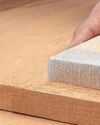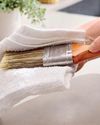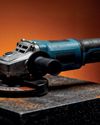PUT YOUR FEET UP
The Home Handyman
|January / February 2022
In this article I will show you how I went about making a double seat garden bench with a footrest

Tools and materials
• Wood: 60mm x 40mm planed softwood battens at 2m lengths and 70mm x 18mm planed soft wood 2m lengths for the slats.
• Assorted woodscrews
• Wood saw
• Wood glue
• Chop saw
• Hammer
• Wood paint
• Battery drill
• Countersink
• Drill bits
• 8mm coach bolts, washers, and nuts
Тhere are quite a few of these bench designs on the internet, but true to form, I didn't have a plan as such and just went along with what came into my head along the way. Maybe it is not the best way to work, but that's the way I do it...
The wood I used is really cheap pine; it's not very good but with plenty of sanding it should be okay as I'm going to paint the bench as well.
I will be using power tools which include a battery drill and a chop saw throughout this build, and as such will be wearing personal protective equipment to include ear and eye protection and a dust mask appropriate for the tool I am using.
After some initial thoughts, I came up with a plan of how I was going to approach the garden bench build. The bench will be of a rustic look, but all holes will be countersunk and filled.
After taking some dimensions for height and width from a bench at a local sports club | will make the bench 140cm in length and 50cm wide and the seating height would be 45cm making for a comfortable seating position. To add comfort I will add four supports for the horizontal slats these slats will have a radiused recess using either a jigsaw or bandsaw.
I am keeping the horizontal slats at full length of the bench - this is not only for strength but also for putting items under the console, say snacks, with drinks on the upper deck. the bench will be constructed using coach bolts and screws making for a sturdy and durable bench.
Step-by-step guide
Denne historien er fra January / February 2022-utgaven av The Home Handyman.
Abonner på Magzter GOLD for å få tilgang til tusenvis av kuraterte premiumhistorier og over 9000 magasiner og aviser.
Allerede abonnent? Logg på
FLERE HISTORIER FRA The Home Handyman

The Home Handyman
KEEP YOUR HOUSE CRITTER FREE
With winter fast approaching, outdoor critters seeking to regulate their temperature are trying their best to get inside. Ants, spiders, moths, mosquitoes, fruit flies, stink bugs, termites, silverfish, and ladybugs, to name a few, can easily make their way into homes, and once they've settled in, it's often hard to get them out.
6 mins
Jul/Aug'25

The Home Handyman
SECRET HIDEOUTS
We all have things we would prefer to keep out of plain sight - family heirlooms, wedding rings, expensive jewellery, medicines or even weapons. Sometimes we just want to keep household items hidden in order to declutter a space. Whether you want to hide items for safety or financial reasons, or simply want to keep your bedroom tidy, there are a few clever storage ideas that could help you out.
2 mins
Jul/Aug'25

The Home Handyman
ABRASIVES DEMYSTIFIED
Abrasive materials are indispensable in countless industries, from woodworking and metal fabrication to automotive repair and electronics manufacturing.
3 mins
Jul/Aug'25

The Home Handyman
THINNERS VS. TURPENTINE
If you've ever finished a painting or staining job and been left wondering how best to clean your brushes, you're not alone. One of the most common DIY questions is: Should I use thinners or turpentine to clean my brushes? The answer depends on the type of paint or coating you've used. Using the wrong solvent can damage your brushes, or worse, make the cleaning job even harder.
2 mins
Jul/Aug'25

The Home Handyman
KEEP THE COLD OUT
Did you know that homes in South Africa are either insulated to a poor standard, compared to European nations, or have no form of insulation at all. In 2011 our National Building Regulations made it compulsory to fit thermal insulation in new buildings and additions to building structures.
5 mins
Jul/Aug'25

The Home Handyman
ANGLE GRINDERS — MASTERING THIS VERSATILE TOOL
When it comes to versatile tools in a DIYer's arsenal, few can match the power and practicality of the angle grinder.
2 mins
Jul/Aug'25

The Home Handyman
KITCHEN CARE – MAINTENANCE TIPS FOR KEY AREAS
The kitchen is the heart of the home where meals are made, memories are shared, and chaos sometimes reigns. But like any hardworking space, your kitchen needs regular maintenance to keep it functional, safe, and looking great.
2 mins
Jul/Aug'25

The Home Handyman
Separating Fact from Fiction
Maintaining your home can be a daunting task, especially with the plethora of DIY tips and tricks floating around the internet.
2 mins
Jul/Aug'25

The Home Handyman
SEALANTS SIMPLIFIED: WHAT TO USE AND WHERE
Whether you’re tackling a weekend DIY fix, remodelling your home, or involved in large-scale construction, sealants are a silent hero that play a vital role in creating watertight, airtight, and secure finishes.
3 mins
Jul/Aug'25

The Home Handyman
COMMON FRIDGE/FREEZER FAULTS
Your fridge freezer is one of the hardest-working appliances in your home, so when it stops performing as it should, it can cause major inconvenience. The good news? Not every fault means an expensive call-out or a trip to the shops for a new one. In many cases, you can fix the issue yourself with a little know-how and a few basic tools.
3 mins
Jul/Aug'25
Translate
Change font size

